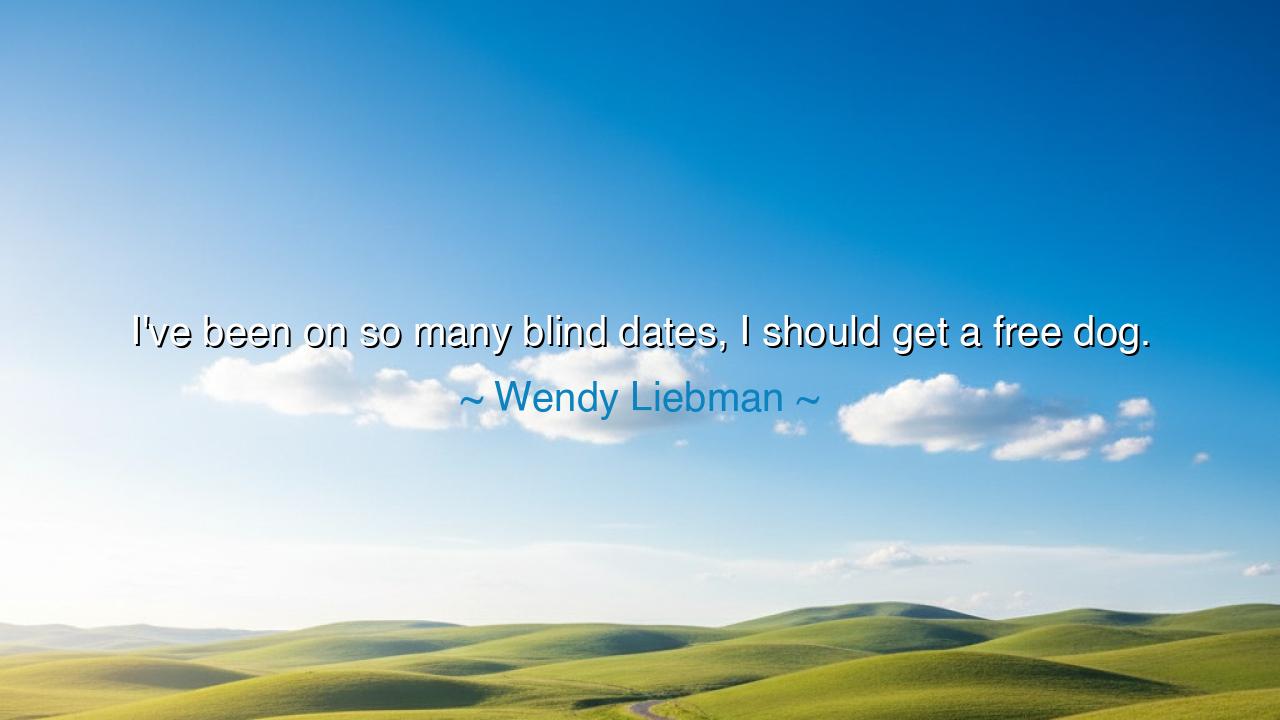
I've been on so many blind dates, I should get a free dog.






In the words of Wendy Liebman, spoken with laughter but carved from the quiet ache of experience, she quips: “I’ve been on so many blind dates, I should get a free dog.” At first, it seems a jest — lighthearted, playful, thrown into the air like a feather. But beneath that feather lies the weight of a timeless truth: the human longing for companionship, and the humor we weave around our disappointments to soften their sting. Her words are both comic and sacred, for they reveal what the ancients knew well — that laughter is not the enemy of sorrow, but its faithful guardian.
The blind date, that ritual of hope and uncertainty, is itself a symbol of the eternal search for love. It is the modern echo of the ancient pilgrimage — the journey one undertakes not knowing what awaits at the destination. Each encounter carries the flicker of possibility, the dream that perhaps this time, destiny will smile. And yet, as Liebman’s humor reminds us, not every road leads to paradise. Many lead to awkward silences, mismatched souls, and the quiet walk home beneath the same moon that once looked down upon the lonely hearts of centuries past.
Her jest about the “free dog” transforms disappointment into wisdom. The dog, creature of loyalty and unconditional affection, becomes a symbol of the simple, enduring love that human hearts so often seek in vain. In the humor lies a revelation: when the world’s promises falter, there remains the steadfast companionship of life itself — the love that asks for nothing but presence. The dog represents what many forget to value: constancy over passion, devotion over drama, faithfulness over excitement. Liebman’s words, though playful, remind us that the heart’s truest joy is found not in endless pursuit, but in loyal connection.
Consider the tale of Diogenes the Cynic, the ancient philosopher who carried a lamp through the streets of Athens in broad daylight, declaring that he was searching for “an honest man.” Though mocked by many, his quest was no different from Liebman’s in spirit — both were seekers wandering through the human comedy, hoping to find sincerity in a world full of masks. Diogenes, in his defiance and wit, revealed what humor has always revealed: that truth often wears the costume of laughter, and that honesty — whether in men or in love — is the rarest of treasures.
Wendy Liebman’s humor belongs to this same lineage of philosophers who cloak wisdom in jest. Through the mirror of comedy, she shows the dignity of persistence, the grace of endurance, and the quiet nobility of one who continues to hope even after disappointment. To laugh at oneself, as she does, is to claim mastery over one’s wounds. It is a declaration that the heart may be bruised, but it is not broken — that love, though elusive, is still worth seeking, if only for the joy of the journey itself.
Her words also carry an unspoken lesson about self-worth. For in jesting that she should “get a dog,” Liebman reminds us that solitude is not a sentence, but a sanctuary. The ancients taught that one must first learn to dwell peacefully within oneself before joining one’s life with another. The philosopher Epicurus once wrote that friendship and simple pleasures are the highest goods; to live well is not to possess many loves, but to cherish a few true ones — and perhaps, even, the loyal companionship of a faithful creature.
The lesson, then, is radiant beneath the humor: Do not measure love by its arrival, but by your ability to keep your heart open. Whether through laughter or tears, remain kind, remain curious, remain brave enough to meet the unknown again. Let every blind date, every failed venture, every lonely night be a step on the pilgrimage toward wisdom — and let no disappointment close the gate of the heart. The practical path is this: laugh often, forgive quickly, and find beauty even in the absurdity of love’s trials.
So, my listener, take these words as gentle counsel: When your search for love wears you thin, remember the spirit of Wendy Liebman — who laughed not because she found love easily, but because she learned to find joy regardless. If the world gives you disappointment, turn it into humor; if the world denies you a soulmate, find companionship in the life that surrounds you — in friends, in nature, in loyal creatures that love without judgment. For laughter, too, is a form of love — and through it, even the weariest heart may yet find its way home.






AAdministratorAdministrator
Welcome, honored guests. Please leave a comment, we will respond soon